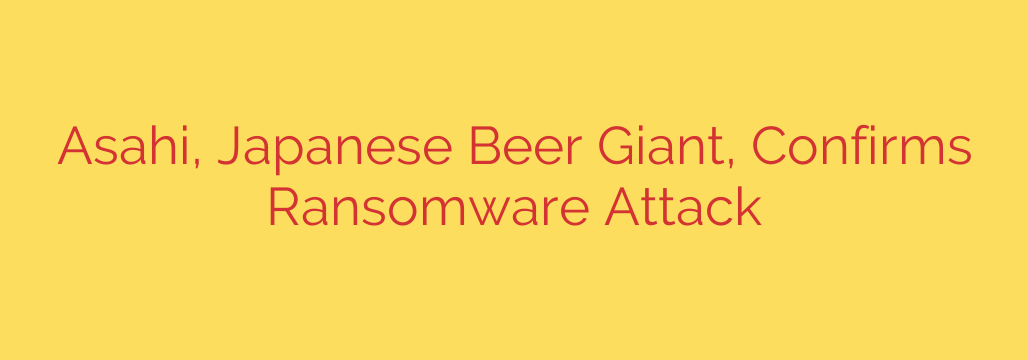
Asahi Breweries Hit by Ransomware Attack, European Operations Disrupted
Asahi Breweries, the Japanese beverage giant behind popular brands like Peroni, Pilsner Urquell, and Grolsch, has confirmed it was the victim of a significant ransomware attack. The cyberattack targeted the company’s European operations, forcing it to shut down key systems and causing widespread business disruption.
This incident is another stark reminder that no industry is safe from the growing threat of cybercrime, with major corporations remaining a prime target for sophisticated hacking groups.
What Happened in the Asahi Cyberattack?
The security breach was first detected in late January, targeting Asahi Breweries Europe Group (ABEG). Early reports suggested the attack was orchestrated by the BlackByte ransomware gang, a group known for its “double-extortion” tactics. This method involves not only encrypting a victim’s files but also exfiltrating sensitive corporate data with the threat of leaking it publicly if the ransom is not paid.
In response to the intrusion, Asahi took immediate action to contain the threat. This included shutting down key IT systems across its Central European operations, a necessary step to prevent the malware from spreading further throughout its network. While this measure helped limit the damage, it also led to significant operational challenges.
The company has since confirmed the incident and launched a full investigation with the help of third-party cybersecurity experts. In a statement, Asahi acknowledged the attack and assured stakeholders that it was working diligently to resolve the situation.
Business Disruption and the Path to Recovery
Shutting down essential computer systems inevitably impacts a company’s ability to function. The attack has likely caused disruptions to Asahi’s production, shipping, and sales logistics throughout Europe. Restoring services after a ransomware attack is a complex and time-consuming process that involves carefully inspecting systems for any remaining malware before bringing them back online from clean backups.
Asahi has stated that it is working to restore the affected systems and resume normal business operations as quickly as possible. The full extent of the data breach and the financial impact of the disruption are still being assessed as the investigation continues.
A Troubling Trend Targeting Critical Industries
The attack on Asahi is not an isolated event. It follows a disturbing pattern of ransomware attacks targeting the food and beverage industry, which is considered part of the nation’s critical infrastructure. In the past year, similar high-profile attacks have crippled operations at Molson Coors and JBS Foods, the world’s largest meat supplier.
These incidents highlight the vulnerability of complex, just-in-time supply chains to cyber threats. Attackers know that companies in this sector face immense pressure to avoid downtime and may be more inclined to pay a ransom to restore their operations quickly.
How to Protect Your Business: Lessons from the Asahi Attack
While it’s impossible to eliminate all cyber risk, businesses can take proactive steps to fortify their defenses against ransomware. The Asahi incident serves as a crucial case study for organizations of all sizes.
Here are essential security measures to implement:
- Implement Multi-Factor Authentication (MFA): Secure all remote access points, email accounts, and critical system logins with MFA. This simple step can block the vast majority of account compromise attempts.
- Conduct Regular Employee Training: Your staff is your first line of defense. Train them to recognize and report phishing emails, suspicious links, and other common social engineering tactics used to deploy ransomware.
- Segment Your Network: By dividing your network into smaller, isolated segments, you can contain a breach to one area and prevent malware from spreading to critical servers and data backups.
- Maintain a Robust Backup and Recovery Strategy: This is your most critical defense. Regularly back up all essential data to an offsite, offline location. Test your backups frequently to ensure you can restore them quickly and reliably in an emergency. An immutable backup that cannot be altered or deleted by attackers is the gold standard.
- Develop an Incident Response Plan: Don’t wait for an attack to decide what to do. Create a clear, actionable plan that outlines the steps to take, who to contact, and how to communicate with stakeholders during a security incident.
The cyberattack on Asahi is a powerful reminder that proactive cybersecurity is not just an IT issue—it’s a core business imperative for ensuring operational resilience in an increasingly dangerous digital world.
Source: https://www.bleepingcomputer.com/news/security/japanese-beer-giant-asahi-confirms-ransomware-attack/








